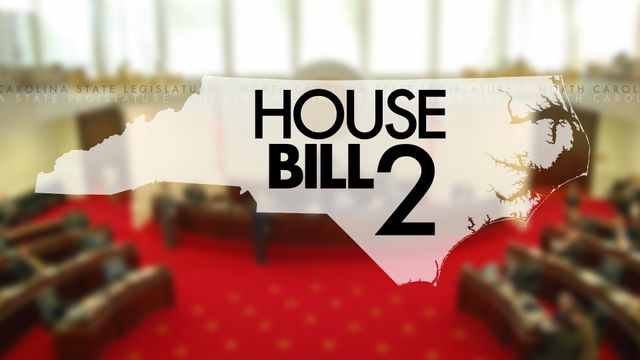McCrory to respond to feds on HB2 after lawmakers refuse to act
North Carolina officials are still trying to determine the stakes in a possible showdown with the federal government over a state law that the U.S. Department of Justice says violates the civil rights of transgender state workers and students.
Posted — UpdatedThe Justice Department said in letters sent Wednesday to Gov. Pat McCrory and other state officials that House Bill 2, which requires transgender people to use public bathrooms that match their birth gender, violates provisions of the federal Civil Rights Act and Title IX of the Education Amendments of 1972.
The government gave state officials until next Monday to "remedy" the violations – essentially not enforce House Bill 2 – or face consequences. State lawmakers said Thursday they have no intention of trying to meet that deadline.
The Governor's Office said McCrory will respond to the Justice Department by Monday, but it remains unclear whether he will tell federal officials that he won't enforce the law, giving lawmakers time to reconsider it, or that the state disagrees with the finding of discrimination, which would propel the case to court.
"My hope is we stand up for what is right and stand up and say, 'You don't have the authority or the right to pick on North Carolina, again, when there's 28 other states with similar laws,'" Lt. Gov. Dan Forest said.
Sarah Preston, acting state director for American Civil Liberties Union, says Forest is wrong.
"This is not something that has been done anywhere else," Preston said.
North Carolina is the only state that has passed legislation regarding gender and restroom use, Preston explained. Additionally, it's the only state to define "sex" as "biological" in state law.
"What, essentially, the federal government has done is interpret the word 'sex' to include discrimination based on sexual orientation and gender identity, Preston explained. "By inserting the word 'biological' in front of 'sex' in our laws in North Carolina, the North Carolina General Assembly made very clear that they do not want to protect LGBT individuals. They made it basically impossible to do that the way that the federal government has done it."
North Carolina receives an estimated $4.5 billion in federal support each year for schools, roads, the environment and other programs, and such funding could be at risk if the government believes the state is flouting federal law.
"It would totally devastate the schools in this state, devastate our roads program," Senate Minority Leader Dan Blue said. "It's just incredible that we're at this point having to debate this."
Public schools alone account for about $1.4 billion in federal funding to the state, and Bill Cobey, chairman of the State Board of Education, said losing that money would hurt the students who need the most support.
For example, more than 750,000 North Carolina students last year benefited from the program that subsidizes school lunches so that students from low-income families can eat lunch for free or at a reduced price, which received $505 million from the government.
"If you literally take the food off the plates of poverty-stricken children in this state that depend on that meal," Cobey said, "I'm not sure they've really thought this thing through."
The Every Student Succeeds Act, the successor to No Child Left Behind, provides $534 million in federal funds to the state to help low-income schools, as well as support English as a second language programs and education for homeless children. The government also provides $306 million for special education programs through the Individuals with Disabilities Education Act and $32 million for career and technical education.
Wake County Public School System officials said next year's budget includes $115 million in federal funding. District officials said they haven't received any direct communication from the federal government related to House Bill 2 or its potential effect on local funding.
The University of North Carolina system also stands to lose $1.4 billion, much of it in the form of research grants and federal financial aid such as Pell grants, in the dispute. UNC President Margaret Spellings said Wednesday that university system administrators were reviewing the Justice Department's notice and would confer with McCrory and other state officials.
Lawmakers passed House Bill 2 in March as a response to a Charlotte ordinance allowing transgender individuals to use the restroom of their choice in public accommodations. Although the bill overturned that local measure, it went further, setting limits on what kind of nondiscrimination measures local governments can enforce and wiping away the ability for workers to sue for employment discrimination in North Carolina courts.
Since its passage, North Carolina has been criticized by corporate executives, entertainers and many local communities and business groups. Some business expansions have been called off, conventions have been moved out of state and concerts have been canceled as people boycott North Carolina over the law.
Blue, D-Wake, said all of that pales when compared with the potential loss of federal funds.
"The price is too astronomical, and it makes no sense," he said. "It's time for adults to reach an adult decision in this thing. Get away from House Bill 2. Repeal it, and let's move on."
Preston said the Justice Department put the state on notice but likely is trying to settle the dispute without taking North Carolina to court.
"The department is saying, 'Let’s work this out. We don’t want you to lose funding,'" she said. "It’s not like the federal government is trying to punish or disable North Carolina."
Forest said he hopes the state doesn't bow to federal pressure, noting that he doesn't think the government will withhold any money from North Carolina.
"When did the people of the United States ever say we’re sending our money to the federal government and they’re going to send it back with whatever strings they want to attach to orchestrate legislation in a state? Our states are sovereign," he said. "We'll certainly never base our policy, I hope, in North Carolina based on what the federal government says they are or aren't going to do for our state."
Cobey, who said he was speaking for himself and not on behalf of the State Board of Education, questioned whether the government would follow through with the threat of pulling federal funding, adding that he expects a legal fight.
"There's always a potential – you need to underscore the word potential. The federal government is always threatening these sorts of things," he said. "This matter has to play out in the courts."
Related Topics
• Credits
Copyright 2024 by Capitol Broadcasting Company. All rights reserved. This material may not be published, broadcast, rewritten or redistributed.






